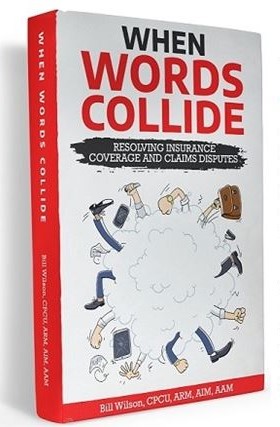Tuesday @2 With Chip Merlin, is going to focus on something the property insurance law blog should discuss upon more often: the basics of property insurance contract interpretation. How can any claims adjuster provide all the policy benefits without identifying the policy terms and determine the applicable coverages so that an investigation of the facts and evaluation of damages can be completed?
The most practical treatise which has recently been published and which I recommend can help everyone in the interpretation of insurance policies, is Bill Wilson’s, When Words Collide—Resolving Insurance Coverage and Claims Disputes. This is not a legal treatise but one which even lawyers doing insurance claim should read as well. Merlin Law Group attorney Amy Currotto noted in, Book Review: When Words Collide, by Bill Wilson:
Bill understands insurance policies at a cellular level. His book teaches the reader how to dissect the mechanisms of confusing policy terms and forms that every insurance industry professional should know. From the very beginning, Bill draws in the reader by referencing pop culture to explain complex insurance concepts. Bill’s range is impressive. He cites Shakespeare, rock stars, and even Inigo Montoya from The Princess Bride: ‘You keep using that word. I do not think it means what you think it means.’ This notably made the book a very entertaining read.
The book begins with Bill’s Ten Policy Interpretation Basics, similar to the Ten Commandments – except for Policy Interpretation. Some of my personal favorites included ‘Insurance is NOT a commodity’ and ‘RTFP!’ This is short for ‘Read the Full Policy.’ However, Bill admits that there are occasions where the ‘F’ has taken on a different connotation. For example, when it is clear that nobody has read the policy, to the detriment of the insured. It’s Bill’s wit and humor that really keeps you reading. These rules of policy interpretation are referenced throughout the book and are woven into the fabric of what it takes to understand an insurance policy.
A more cerebral work, Insurance Contract Analysis, written by the American Institute for Chartered Property Casualty Underwriters, features the late Don Malecki as a co-author. It is full of information about insurance contract interpretation and includes references to many insurance good faith concepts that many fail to discuss after a loss occurs. For instance, Exhibit 1.1 has an Insurance Consumer’s Bill of Rights and Responsibilities which was published by the National Association of Professional Insurance Agents and The Consumer Insurance Interest Group. Most insurance adjusters would never know about this and what insurance agents, who sell the insurance contracts to be interpreted, pledge themselves to support as principles.
There are many legal treatise and law review discussions of insurance contract interpretation and how to accomplish such contract analysis. For example, in the Journal of Insurance Regulation, an article, “An Analysis of Interpretation of Insurance Contracts: Common Law Versus Strict Contra Proferentem,”1 lists over three pages of reference materials for students to learn and consider how insurance contract interpretation rules differ and whether they impact the cost of insurance in the marketplace.
In, The Reasonable Expectations Doctrine Provides Judges with a Tool for Insurance Contract Interpretation, I discussed an amicus brief I filed in South Carolina regarding the reasonable expectations doctrine. I will discuss this interpretation standard in our Tuesday at 2 session this afternoon, but also want to point out what I said about the insurance product and why it is so important to us:
“The insurance industry may be the most influential industry in America, if not the world. Insurance is the foundation of our economy and a necessity of day-to-day life. It is required to obtain a drivers license, own a car, purchase a home, own a business, and even to receive medical care. While most people think about insurance only at the time of purchase, when accidents happen or disaster strikes, insurance is the only thing that stands between an individual, family, or business and financial ruin.
Insurance is a product that transfers risk and gives people access to resources they would otherwise be unable to afford. Simply stated, insurance is a method of hedging a bet; for the price of the premium, the insurer assumes the financial risk of a potential loss. The insurer pools the premiums of similarly situated insureds, so it has the funds to pay when covered losses occur. In most cases, individuals and businesses would not be able to afford the loss insured against, so insurance is essential to keep an affluent society afloat. When the risk of loss is assumed by a third party, banks lend money, products are manufactured and purchased, and individual wealth tends to increase. In response, individuals and businesses achieve more affluence and purchase more insurance to protect from unaffordable loss. As society’s affluence increases, insurance becomes a necessity, not a luxury.”
All of us participating in the property insurance claims industry need to be skilled at interpreting property insurance policies and constantly studying them so that we can better serve the insuring public.
I hope you can join me this afternoon while we go through some of these basics. Here is a link for the livestream.
Thought For The Day
In doubtful cases the more liberal interpretation must always be preferred.
—Marcus Tullius Cicero
_____________________________________________
1 Henry, Randy D., “An Analysis of Interpretation of Insurance Contracts: Common Law Versus Strict Contra Proferentem,” Journal of Insurance Regulation, Vol. 36, No. 1 (2007).





